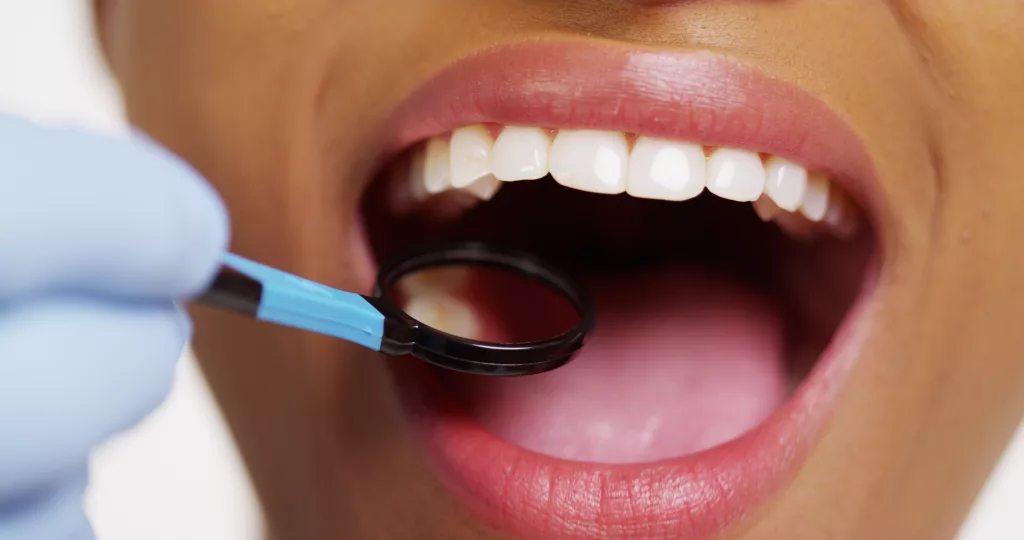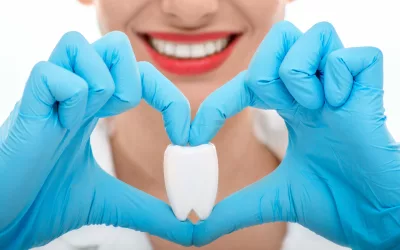
Top ten Optimal oral hygiene tips quick tips:
- Brush your teeth twice a day with a fluoride toothpaste for at least two minutes.
- Use interdental brushes or floss daily to remove plaque and food particles from between your teeth.
- Replace your toothbrush every three to four months, or sooner if the bristles are frayed.
- Limit your intake of sugary and acidic foods and drinks to prevent tooth decay.
- Chew sugar-free gum after meals to increase saliva flow and neutralise harmful acids.
- Rinse your mouth with water after eating or drinking anything that might stain your teeth.
- Use a mouthwash to help reduce plaque and freshen breath.
- Avoid smoking or using tobacco products, as they can cause tooth stains, bad breath, and oral cancer.
- Visit your dentist regularly for check-ups and professional cleanings.
- Practise good overall health habits, such as eating a balanced diet and exercising regularly, to promote healthy teeth and gums.
A bright and healthy smile is one of the most attractive features you can possess
Good oral hygiene routine
A bright and healthy smile is one of the most attractive features you can possess. It not only enhances your appearance but also boosts your confidence and self-esteem. But achieving and maintaining optimal oral hygiene is more than just brushing and flossing regularly. It involves a combination of good habits, healthy choices, and the right products. In this article, we will provide you with the top ten tips to keep your teeth healthy and beautiful, incorporating both natural and fluoride options.
- Brush Twice a Day for Two Minutes with Fluoride Toothpaste
Brushing your teeth twice a day is the foundation of good oral hygiene. But using the right toothpaste can make a significant difference in preventing tooth decay and maintaining strong teeth. Fluoride toothpaste is the most effective in protecting your teeth against cavities by strengthening the enamel. Ensure that you brush for at least two minutes each time and reach all areas of your mouth.
- Use Interdental Brushes or Floss Daily
Brushing alone cannot remove all the food particles and plaque from between your teeth. That’s where interdental brushes or flossing comes in. These tools can reach the tight spaces where toothbrush bristles cannot. Flossing also helps prevent gum disease by removing bacteria and food debris from under the gum line. Incorporate interdental brushes or flossing into your daily routine for optimal oral health.
Over time, toothbrush bristles wear out, and they become less effective in removing plaque and food particles. It’s recommended that you replace your toothbrush every three to four months or sooner if the bristles are frayed. Using a worn-out toothbrush can also cause damage to your gums and enamel.
- Limit Your Intake of Sugary and Acidic Foods and Drinks
Sugary and acidic foods and drinks are the main culprits for tooth decay and erosion. The bacteria in your mouth thrive on sugar, producing acids that attack your enamel. Acidic foods and drinks also weaken your enamel, making it more susceptible to decay. Limit your consumption of these foods and drinks to prevent tooth damage.
- Chew Sugar-Free Gum After Meals
Chewing sugar-free gum after meals can help increase saliva flow, which neutralizes harmful acids and helps wash away food particles. It also freshens your breath and prevents dry mouth. Choose a gum with xylitol, a natural sweetener that inhibits the growth of cavity-causing bacteria.
- Rinse Your Mouth with Water After Eating or Drinking
If you can’t brush your teeth after a meal, rinsing your mouth with water can help remove food particles and prevent staining. It’s particularly important after consuming sugary or acidic foods and drinks. Swish water around your mouth for at least 30 seconds and spit it out. Avoid using hot water as it can damage your enamel.
- Use a Mouthwash to Help Reduce Plaque and Freshen Breath
Mouthwash can be an excellent addition to your oral hygiene routine. It can help reduce plaque buildup, freshen your breath, and prevent gum disease. Look for a mouthwash that contains fluoride and natural ingredients like tea tree oil, which has antimicrobial properties that kill bacteria.
- Avoid Smoking or Using Tobacco Products
Smoking and using tobacco products not only cause bad breath and tooth stains but also increase your risk of oral cancer. The chemicals in tobacco products can damage your gums and cause gum disease. Quitting smoking and tobacco products can significantly improve your oral health and overall wellbeing.
- Visit Your Dentist Regularly
Regular dental check-ups are essential for maintaining good oral health. Your dentist
can detect and treat any dental problems before they worsen. They can also provide you with professional cleanings that remove tartar buildup and surface stains. Schedule regular dental visits every six months or as recommended by your dentist.
- Good oral hygiene practices
Your oral health is connected to your overall health. Practising healthy habits can improve both. Eating a balanced diet rich in nutrients and drinking plenty of water can help promote healthy teeth and gums. Regular exercise can also improve your oral health by increasing blood flow to your gums. Practising stress management techniques like yoga and meditation can also benefit your oral health.
Natural Products for Optimal Oral Hygiene
While fluoride toothpaste and mouthwash are effective in preventing tooth decay and maintaining oral health, some people prefer natural alternatives. Here are some natural products that can help keep your teeth healthy and beautiful.
- Baking Soda: Baking soda has natural whitening and abrasive properties that can remove surface stains and plaque. Mix a small amount of baking soda with water and brush your teeth gently.
- Coconut Oil: Coconut oil has antimicrobial properties that kill bacteria and prevent gum disease. Swish a tablespoon of coconut oil in your mouth for at least 10 minutes, spit it out, and rinse your mouth with water.
- Activated Charcoal: Activated charcoal can remove surface stains and whiten your teeth naturally. Dip a wet toothbrush into activated charcoal powder and brush your teeth gently.
- Tea Tree Oil: Tea tree oil has antimicrobial and anti-inflammatory properties that can prevent gum disease and freshen your breath. Add a few drops of tea tree oil to your toothpaste or rinse your mouth with a few drops diluted in water.
- Clove Oil: Clove oil has natural analgesic and antibacterial properties that can relieve toothaches and prevent cavities. Apply a drop of clove oil to a cotton ball and place it on the affected area for a few minutes.
Signs of poor oral hygiene
Bad oral habbits can lead to various dental problems, and several signs indicate that you may not be taking good care of your teeth and gums. Here are some common symptoms of poor oral hygiene:
- Bad Breath: Bad breath, also known as halitosis, occurs when food particles and bacteria build up in your mouth, they can produce a foul smell.
- Tooth Decay: Tooth decay occurs when bacteria in your mouth produce acid that erodes your tooth enamel, leading to cavities and, eventually, tooth loss.
- Gum Disease: Gum disease, also known as periodontitis, occurs when bacteria in your mouth infect and inflame your gums; this can cause redness, swelling, and bleeding.
- Stained Teeth: From foods, drinks, and smoking.
- Tooth Sensitivity: Tooth sensitivity can occur when your tooth enamel wears away, exposing the sensitive inner layers of your teeth; this can cause pain and discomfort when you eat or drink hot, cold, or sweet foods.
- Mouth Sores: Such as canker sores, which can be painful and make it difficult to eat and speak.
If you are experiencing any of these signs, it is essential to take action to improve your oral hygiene. Practising our top ten tips mentioned earlier can help prevent these problems and improve your oral health. Additionally, scheduling regular dental check-ups with your dentist can help detect and treat dental problems early on.
In conclusion, incorporating these tips into your daily routine can help you achieve optimal oral health and a beautiful smile. Using natural products in addition to fluoride products can provide you with additional benefits. Remember that good oral hygiene goes beyond brushing and flossing. Practising healthy habits and visiting your dentist regularly are also crucial for maintaining good oral health. Start implementing these tips today and enjoy a lifetime of healthy and beautiful teeth.
For more information about dental hygiene tips, oral hygiene products, oral hygiene for kids, types of oral hygiene, hit the subscribe button below!
Subscribe for more useful information
Share this:
- Click to share on Twitter (Opens in new window)
- Click to email a link to a friend (Opens in new window)
- Click to share on LinkedIn (Opens in new window)
- Click to share on Reddit (Opens in new window)
- Click to share on Tumblr (Opens in new window)
- Click to share on Pinterest (Opens in new window)
- Click to share on Pocket (Opens in new window)
- Click to share on Telegram (Opens in new window)
- Click to share on WhatsApp (Opens in new window)
Related
General Private Dental Prices
| Service | Price |
|---|---|
| Examination / Consultation | £70.00 |
| Scale and polish | from £70.00 |
| Dental hygiene appointment | £80.00 |
| X-ray | £15.00 |
| White filling | from £135.00 |
| Teeth whitening | £479.00 |
| Porcelain crown | from £650.00 |
| Veneers | from £695.50 |
| Dentures | from £850.50 |
| Root Canal Treatment | from £430.00 |
| Implant & Crown | from £2689.00 |
| Extraction | from £170.00 |
| Emergency Appointment | £130.00 |
Contact Us.
Hours & Info
09:00 - 17:00
Closed for lunch, 13:00 - 14:00
Categories
- Cosmetic Dentistry
- Dental Care Plans
- Dental Crowns and Bridges
- Dental Exams and Cleanings
- Dental Hygiene
- Dental Implants
- Dentures and Partial Dentures
- Emergency Dentistry
- Endodontics
- General
- General Dentistry
- Gum Disease Treatment
- health and wellbeing
- Invisalign
- NHS Dentist
- Save Money
- Teeth Whitening
- Tooth Extraction
- Toothache
- Toothpaste
To find out more, including how to control cookies, see here: Cookie Policy
Emergency?!
Is a dental emergency causing you pain or discomfort? Take action right away by contacting Reigate Dental Centre. Our office is open Monday through Saturday from 9 am to 5 pm. You can call us on 01737 224 870 or send us a message via the contact form below, and we’ll endeavour to respond as soon as possible.
Don’t wait with a dental emergency—the sooner you call and see us, the better. We’re committed to promptly treating any urgent dental issue with the highest-quality care and compassionately.
Related articles
-
Pingback: Top-Rated Dentist in Reigate for Unmatched Dental Care - Reigate Dental Centre - Reigate Dental



